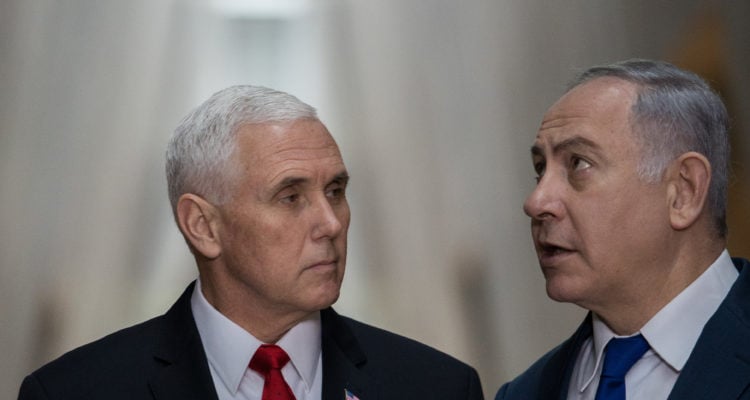Experts say it is unlikely Israel will see an upsurge in Palestinian violence in the immediate aftermath of Pence’s visit, but express concern for Israel and the Palestinians’ long-term future.
By: Margot Dudkevitch, World Israel News
The American administration’s warmth and firm commitment of friendship towards Israel, the recognition of Jerusalem as its capital, and plans to transfer the US Embassy to Jerusalem by the end of next year, may come back to haunt Israel, some Middle East experts warn. While the latest visit of US Vice President Mike Pence has left the Jewish State basking in a bath of warm superlatives, it could limit the US administration’s ability to resolve the Israeli Palestinian conflict, some say.
At the same time, experts who spoke with World Israel News, agree that it is unlikely that Israel will witness an upsurge in Palestinian violence in response to the change in the American administration’s policy towards Israel.
Dr. Dikla Cohen of the Hebrew University’s Truman Institute believes the ball is in the Palestinian’s court, and if they decide to move forward they can only gain from the situation. While the Palestinian leadership is still reverberating from the marked change in the US Administration’s attitude towards Israel, US Vice President Mike Pence made several statements during his visit to the Jewish State that leaves the door open for the Palestinians to return to the negotiating table with Israel, she says. Pence clearly stated that a two-state solution, and future borders including Jerusalem can only be decided between the two sides, she notes.
“The Palestinians are still trying to digest the situation and the change in US policy towards Israel. It was the Palestinians who chose to boycott Pence, who also visited Jordan and Egypt. Now they are receiving the cold shoulder from Arab countries, and they need to reach the realization that time is not on their side, and accept that the best way to move forward, is to return to the negotiating table and accept the US as mediator,” she insists.
Situation does not bode well, for Israel or Palestinians
Dr. Ronni Shaked, an expert on Palestinian affairs also from the Hebrew University’s Truman Institute, warns the current situation does not bode well for Israel or the Palestinians. The Palestinian people are frustrated and depressed and have reached a deadlock concerning peace negotiations with Israel, he says.
“They feel betrayed by the Arab world, they have lost faith in the current US administration’s ability to act as an honest mediator and they don’t trust President Donald Trump, and the Europeans are busy dealing with their own issues, ” Shaked tells World Israel News.
Palestinian President Mahmoud Abbas’ efforts to garner support for a Palestinian state in the European arena failed, and he will return to Ramallah empty-handed. Despite this, both Shaked and Cohen believe his position as leader of the Palestinian people is not in jeopardy. “Abbas will remain the president until he dies,” says Shaked.
Middle East expert Dr. Dina Lisnyansky of Ariel University in Samaria believes while exiled Fatah leader and foe of Abbas, Mohammed Dahlan, could be an alternative successor, it is unlikely to happen, and Abbas will remain in power.
The gap of mistrust between Israel and the Palestinians is widening, and is forcing the Palestinians to turn to popular resistance, which they view is the only legitimate way to achieve their aspirations, Shaked claims. “The Second Intifada broke out at the time because the Palestinians felt defeated, and they are facing the same situation today, ” he says.
Palestinians unite in dismay over Jerusalem
The only thing left that unites the Palestinians across the board is the status of Jerusalem, Shaked adds. While President Trump’s policies may be good for Israel, they are pushing the Palestinians towards resistance and struggle. But he believes Israel is unlikely to witness a massive upsurge in violence as seen in the Second Intifada. Lisnyansky and Cohen also agree that widespread violence is unlikely to break out in response to Pence’s visit, despite the current situation on the ground.
Despite this, “All the Palestinian factions including Abbas still view waging a jihad or holy war against Israel as a legitimate means,” Lisnyansky says. She believes the lull in Palestinian violence that occurs is not only due to the success of Israel’s security forces in thwarting attacks, but also because of the ongoing security cooperation between the sides, which continues despite Abbas’ demands a week ago in Ramallah to suspend security coordination. Cohen believes it is this very mechanism that could pave the way for the return to the negotiating table.
“The White House has already announced a total breakdown in talks between Washington and Ramallah. Yet I believe it is possible that secret talks between the Israeli and Palestinian commanders on the ground, could well lead the way to the return of direct peace talks between the sides,” she says.
Has Abbas ‘lost faith’?
According to Shaked, the reality on the ground today has led to the creation of two de facto Israeli and Palestinian states, living side by side in hate and animosity. “The situation is preventing any chance for a better future,” he warns. Lisnyansky believes the Palestinian leader has lost faith in a two-state solution or any chance of renewing peace negotiations with Israel.
“The only ones who continue to believe that the two-state solution will resolve the conflict are those affiliated with the Left in Israel, and Jordan, Egypt and Saudi Arabia.” Taking the current situation into account, Cohen believes the only way forward is for Israel to lower its profile. “Trump pulled the table cloth from under the Palestinians and they are still reeling from the shock,” says Cohen.
“Allowing talks between Israeli and Palestinian security officials to take place will signal a kind of willingness to return to negotiations. The Palestinians must realize that resuming peace talks with Israel will be in their favor,” she says.





